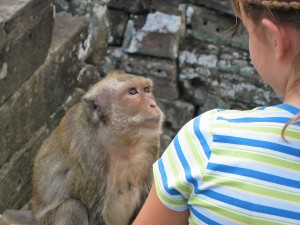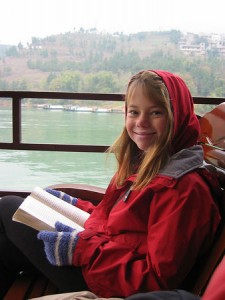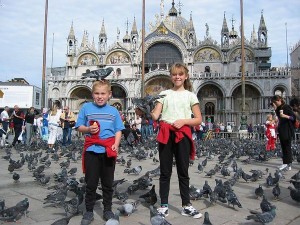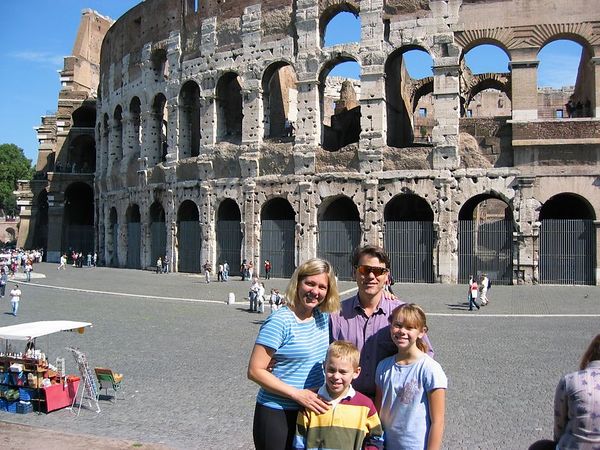So, you’re thinking that someday you’ll settle down, get married, and have children. Or maybe you’ve been there, done that. Does this mean that you’ll sit on the couch, comatose, in front of the TV late at night, longing for the days when you were free and adventurous? Do you see that goal of traveling around the world fading into oblivion?
 No way! Traveling around the world with children is not only possible, it’s even more fun than reruns of Gilligan’s Island. During our family of four’s 52-week, around-the-world trip, not only did we experience the wonders of the world, from the stunning Angkor Wat in Cambodia to the amazing Amazon Rainforest, we discovered sites and had adventures that we never would have dreamed of had we not had children in tow.
No way! Traveling around the world with children is not only possible, it’s even more fun than reruns of Gilligan’s Island. During our family of four’s 52-week, around-the-world trip, not only did we experience the wonders of the world, from the stunning Angkor Wat in Cambodia to the amazing Amazon Rainforest, we discovered sites and had adventures that we never would have dreamed of had we not had children in tow.
Did you know that the United Arab Emirates has the galaxy’s best water park? Or that Carnaval in Latin America is much more family-oriented than you might expect after watching Blame it on Rio? Can anything compare to seeing children of different cultures and colors enthusiastically hunting chameleons together in the mountains of East Africa?
Before we had children, my wife, September, and I discovered how traveling can shape one’s thinking. We wanted to give this experience to our children. From that early concept the idea of a year-long around-the-world trip with our children emerged. Jordan, our youngest, was just learning to talk when he heard of the trip. When referring to it, the words “world-the-round trip” came tumbling out of his mouth; the name stuck. Katrina, three years older than Jordan, hadn’t yet been to kindergarten when she cycled down the Pacific Coast highway on the back of a tandem bicycle.
As the children grew older we backpacked and camped in far-flung corners of the world to learn what worked and what to expect. Saving and planning became family activities. To unite us in our goal we would consider even modest expenditures as a family and say, “Do we really need this, or would we rather save the money for our world-the-round trip?”
Finally the time came and we quit our jobs and packed up our home. Over the next 52 weeks we visited 28 countries on five continents, crossing 24 time zones. Along the way we saw the beauty of the Swiss Alps, the grandeur of the Great Wall of China and the ugliness of the Cambodian Killing Fields. We stayed in the humblest of inns of the Bolivian Altiplano and witnessed the dazzling lights of Hong Kong.
Think you might want to do something like this? You’ve come to the right place. Be confident that the most difficult part will be to step on that first airplane, full of anticipation and anxiety.
What is the Magic Age for Children to Travel?
 We’ve known families who have taken babies and toddlers out on extended trips, and as long as both parents have the energy to attend to the constant physical needs of a child this young, there’s no reason to rule out traveling with very young children. But if you want your children to remember much of where they’ve been, it’s probably best to wait until they are a bit older. One criterion in our family was that our youngest child had to be able and willing to read long books – there’s lots of down-time on the road. I couldn’t even imagine tackling a trip of this magnitude with children who couldn’t keep themselves entertained with a good book. At the other end of the age window, we wanted to leave before our oldest was in high school, as we felt that missing a year of high school might be stunt them both academically and socially. We ended up leaving when our children were 8 and 11 – old enough to understand what was going on, but young enough that they weren’t embarrassed to be hanging out with their parents.
We’ve known families who have taken babies and toddlers out on extended trips, and as long as both parents have the energy to attend to the constant physical needs of a child this young, there’s no reason to rule out traveling with very young children. But if you want your children to remember much of where they’ve been, it’s probably best to wait until they are a bit older. One criterion in our family was that our youngest child had to be able and willing to read long books – there’s lots of down-time on the road. I couldn’t even imagine tackling a trip of this magnitude with children who couldn’t keep themselves entertained with a good book. At the other end of the age window, we wanted to leave before our oldest was in high school, as we felt that missing a year of high school might be stunt them both academically and socially. We ended up leaving when our children were 8 and 11 – old enough to understand what was going on, but young enough that they weren’t embarrassed to be hanging out with their parents.
Of course, now that we’ve been there and done that, and we’re thinking of our next extended adventure, we’re wondering if having our oldest child miss a semester or two of high school could really be that big of a deal!
Set Reasonable Expectations
If you’re thinking of striking out on the road with your children, keep in mind that your itinerary is not going to be exactly the same as if you were traveling with only adults. Many children will declare that museums are b-o-o-o-ring, and if you’ve seen more than a couple of castles in Europe, you’ve probably seen enough. Rather than try to see every last temple and shrine in Tokyo, why not find Thunder Dolphin, one of the world’s coolest roller-coasters, conveniently located in downtown Tokyo? Or play paintball in Panama City. Make a point to discover the best chocolate (Bariloche, Argentina) and the worst ice cream (Turkey).
You’ll meet a whole different set of people than you would meet if you stayed on the typical guidebook’s museum/nightclub/shopping circuit. And these interactions with real people – people who have nothing to do with the travel industry – will be some of your most cherished memories.
Take it Slow
 Ever had a day where you took a ferry ride at 7:00 in the morning, visited an archaeological site at 10:00, took a tour of an ancient church at 1:00, went on a cycle tour at 3:00, and took in a concert in the evening? Your kids won’t put up with it, and if they’re miserable, everyone in the family suffers. Commit to two ground rules:
Ever had a day where you took a ferry ride at 7:00 in the morning, visited an archaeological site at 10:00, took a tour of an ancient church at 1:00, went on a cycle tour at 3:00, and took in a concert in the evening? Your kids won’t put up with it, and if they’re miserable, everyone in the family suffers. Commit to two ground rules:
1. One significant activity per day
That means one hike, or one visit to a museum, or one trip to a historical site. After that, spend the rest of the day in unstructured activities, perhaps at the park tossing around a Frisbee. And yes, you will need to pack that Frisbee. Or baseball. Or origami paper, or whatever it is your children are passionate about. You can probably get away with leaving the trombone at home, but just because you’re taking a year off from your normal lives doesn’t mean that your child’s every interest will be suspended. We hauled half a ream of paper on our tandem bicycles throughout Europe so that our 8-year-old son could continue to design superheroes and work on his self-authored 100-plus page comic books.
2. Weekly P-Day (Preparation Day)
About once a week plan on a no-travel day; spend the day simply relaxing and preparing for the upcoming week. That means hanging out at the hostel doing laundry, writing e-mail home and trying to figure out where you will even be the next week.
Won’t the Children Be Permanently Scarred from Missing a Year of School?
 Disregard that school propaganda! Your kids will be fine. The experience of seeing the world will be an education in and of itself, though it won’t help them to learn how to factor a polynomial. After considering the public school curriculum our children would miss for a year, we concluded there was one subject if in which they fell behind, it would significantly impact their opportunities for academic advancement for years to come: math.
Disregard that school propaganda! Your kids will be fine. The experience of seeing the world will be an education in and of itself, though it won’t help them to learn how to factor a polynomial. After considering the public school curriculum our children would miss for a year, we concluded there was one subject if in which they fell behind, it would significantly impact their opportunities for academic advancement for years to come: math.
Before we left on our trip we purchased math workbooks for the kids’ grade levels and signed up for online homework help. As we traveled we then spent an hour every morning working on math with our kids. In that one hour per day for a year the kids went through two full years’ worth of math books. When they returned to public schools the next year, they were ahead of many of their classmates. Click here for more on home schooling while traveling.
School is, of course, more than mathematics. Before we left, September ordered age appropriate books for the kids that covered some aspect of the places we were to visit. Grandma then shipped a box of books to us via FedEx wherever we happened to be staying. Shipping books around the world isn’t cheap, but reading The Red Scarf Girl about the Chinese Cultural Revolution had a much greater influence on them when read in Beijing, compared to if it were read at home. Click here for a country-specific reading list for any world-traveling kid.
Lastly, the kids wrote in journals every night. Between formal math lessons, lots of reading, plenty of journal writing, and the learning that naturally comes from experiencing other cultures, any kid will receive a fine education.
When we returned home, the kids simply moved on to the following grade with their peers as if nothing were amiss. Indeed, nothing was.
Won’t it Cost a Fortune?
In global terms, yes, it will. In local terms, you’d be surprised at the numbers. Traveling abroad for a year costs less than supporting a family for a year in many U.S. coastal cities. Unfortunately, the pay isn’t as good. So, unless you rode the stock options wave of the late ’90s and cashed in at the peak, you’ll need to make some life adjustments in order to save.
Depending on how you travel, you should budget about $50 per person per day, not including airfares, even if that person is only eight years old. That was our actual cash outlay, averaged over one year, for everything from hostels, to ice cream on the beach, to long-distance train fares. As they say, your mileage may vary. This number can be reduced perhaps as much as half by spending less time in locations like London or Tokyo, and more time in budget havens like Bangkok or Mumbai. Stay tuned for a future article focusing just on how to make a realistic budget.
But Why Do Extended Travel With Kids?
 Well, first of all, it’s hard to get a babysitter for a whole year. If you want to continue your adventurous lifestyle, you’re just going to have to bring ’em with you! And really, what’s more important than spending time together as a family? Because as anyone with school-aged children knows, between work, school, soccer, piano lessons, Cub Scouts and gymnastics, it can become impossible to find enough time to spend together. But traveler beware! After only a few days of traveling together, I remember sleeping in a tent with a rather small elbow in my back all night thinking “What have I done?!” It’s true, all that togetherness was a bit overwhelming at first. Yet it was only a few weeks later that our family had mastered the art of communicating by quoting lines from favorite sitcoms. By the time we returned we had spent 365 solid days within two feet of one another, and our modest-sized house seemed so unnaturally large that we couldn’t bear to be in separate rooms.
Well, first of all, it’s hard to get a babysitter for a whole year. If you want to continue your adventurous lifestyle, you’re just going to have to bring ’em with you! And really, what’s more important than spending time together as a family? Because as anyone with school-aged children knows, between work, school, soccer, piano lessons, Cub Scouts and gymnastics, it can become impossible to find enough time to spend together. But traveler beware! After only a few days of traveling together, I remember sleeping in a tent with a rather small elbow in my back all night thinking “What have I done?!” It’s true, all that togetherness was a bit overwhelming at first. Yet it was only a few weeks later that our family had mastered the art of communicating by quoting lines from favorite sitcoms. By the time we returned we had spent 365 solid days within two feet of one another, and our modest-sized house seemed so unnaturally large that we couldn’t bear to be in separate rooms.
Won’t We Miss Our Stuff?
There are far more reasons to plan a bout of extended travel than getting to know your spouse, children, and even yourself better than you ever thought possible. Our society puts a very high value on material possessions. So high, in fact, that in getting caught in the chase of acquiring more, many people are unaware of what they have. Traveling to a developing country is the best way to demonstrate to the younger generation that as long as you have something to eat, something to wear, and somewhere to sleep, you are among the world’s elite. The iPhone is, like, totally optional.
Won’t I be Putting My Children in Harm’s Way?
The world is a small place, and it’s getting smaller. It’s tempting to try and understand that world through the lens of mass media, which would lead us to believe that around every corner lurks a terrorist who is bent on annihilating every Westerner he sees. After spending a year traveling with our kids, we learned that our world is a much more complicated and wonderful place than what you might believe by watching the six o’clock news. We felt welcome everywhere we went, from Oman to Beijing. We even felt welcome in France! Our children were a magnet for friendly strangers, and we were showered with goodwill wherever we went.
How Should Children Shape the Itinerary?
 There are two ways to answer this question.
There are two ways to answer this question.
We have a huge map of the world on a wall in our home. Before we left on our trip, we put sticky notes on our map for all the places we wanted to visit, and why. This was a process to which everyone in the family contributed. Jordan, after studying China in school, wanted to visit the Great Wall. After watching a few too many National Geographic documentaries, Katrina had romantic notions about the Serengeti. These destinations and more made our itinerary’s final cut.
The other half of that question is, are there countries to which you shouldn’t take the kids?
September and I honeymooned in Mexico. While we were checking in at a small roadside inn near the Yucatan Peninsula’s Chitzen Itza, we observed an American family with a high-school aged daughter who was absolutely hysterical because she had just seen the largest spider in her life. “I won’t go in there!” she screamed, pointing to the hotel room. “You can’t make me go in there!” Between frantic sobs, the girl swore she wasn’t going to get out of the rental car for the next two weeks. Perhaps she and Ron Weasley share an unnatural phobia for spiders. But her parents’ rather coddling reaction to this scene suggested that perhaps she had simply spent too many years on the greener side of that white picket fence.
Kids are much more flexible and adaptable than adults; they’ll adapt to those cold water showers and that 23-hour bus ride much better than you will. After a few weeks on the road, “home” will simply be where your stuff is.
Don’t shun the developing world because you believe the conditions are too harsh for kids. Remember, some kids live there. Focusing just on the industrialized nations of the world during your travels will give you and your kids a skewed version of reality. Plus, it’ll be mighty hard on your budget! The world is both a beautiful and ugly place. You should have the intestinal fortitude to see it – all of it – for what it is. Be sure to include the full spectrum of what the world has to offer, from the grandeur of the Alps to the stunning poverty off the beaten path in Africa. Visit historical sites from Cambodia’s Killing Fields to the birthplace of Gutenberg’s printing press. Revel in the contradictions that make us all human and you will find that we are much more alike than we are different.
Health Concerns
Reasonably healthy people have nothing to fear. There is impressive medical care all over the world that is cheaper and more accessible than what you will find in the U.S.
When traveling in developing countries there are two mantras to live by, or suffer the indignity of diarrhea. First, stick to bottled water for everything, including ice in drinks and brushing teeth. Second, before you put anything in your mouth wash it, cook it, peel it or forget it.
Even when being careful, some pathogen will find a way to sneak through your defenses. While in Poland, someone’s bio-terrorism experiment disguised as a cheeseburger found its way onto my plate. This could happen to you, so bring along some Cipro.
Be Prepared
 We spent many sleepless nights before leaving on our year-long journey worrying about all of the things that could go wrong. We needn’t have worried because it didn’t help; nearly everything that we imagined could go wrong, did. You will face challenges that you couldn’t fathom. Six weeks into an eighteen-week bicycling trip across Europe, Katrina was rock climbing and her rope broke. She tumbled to the ground and shattered her tibia. Rising to the challenge of coping with a broken leg pulled us together as a family in ways that wouldn’t have been possible otherwise. While we were grateful the accident wasn’t much worse, the sudden change in plans taught us survival skills we would appreciate over and over again.
We spent many sleepless nights before leaving on our year-long journey worrying about all of the things that could go wrong. We needn’t have worried because it didn’t help; nearly everything that we imagined could go wrong, did. You will face challenges that you couldn’t fathom. Six weeks into an eighteen-week bicycling trip across Europe, Katrina was rock climbing and her rope broke. She tumbled to the ground and shattered her tibia. Rising to the challenge of coping with a broken leg pulled us together as a family in ways that wouldn’t have been possible otherwise. While we were grateful the accident wasn’t much worse, the sudden change in plans taught us survival skills we would appreciate over and over again.
There will be other types of challenges as well. For example, most kids from Western cultures are used to strangers keeping their distance. As we proceeded farther south in Europe, we warned our kids that their personal force fields would be invaded, but we had no idea what a culture shock Turkey would be to our eight-year-old son. The first time a stranger swooped down and grabbed Jordan, exclaiming, “You’re mine now!” was a bit of a shock for all of us. Turks not only love children, but they put a high value on male children and do not have the same cultural requirement of keeping an arm’s length away. Mix that with the novelty of blond hair and blue eyes, and Jordan got way more attention than he bargained for. This pattern of overly-abundant affection from strangers continued throughout Asia, in Africa, and well into Latin America.
Things will happen that you can’t control. Be prepared and be flexible, and you’ll come to enjoy the craziness that makes our planet spin.
In Summary
Taking your family to the edge of the world and back takes some planning, and unless you win the lottery it will probably take some serious sacrifices, but for most people, it’s an opportunity that only comes around once. Do the math: one backyard landscaping + one new minivan = many months on the road. The minivan will get old, and weeds will eventually take over the backyard, but you’ll remember the experiences you had on the road with your children forever. Take your children backpacking in Thailand and have them paddle a canoe in the Amazon. Experience together the grandeur of Istanbul’s Hagia Sophia. They’ll understand that the inhabitants of this planet are much more complicated and interesting than what they’ve seen on CNN. You will too.

8 Comments
Is there any chance I could get a list of the books your children read in preparation for or during your trip? The links do not work for me.
I really enjoyed your book and have been inspired!
Thank you!
Trina
Sorry ’bout that! I’ll email you directly, but I’ll also fix that link.
Could I get the reading list as well? Just finished your book and loved your humorous style, as well as obviously the content! We are not planning a r-t-w trip at the moment, but do love to travel with our kids. We’re off to China in a few months with them so would love to have some reading recommendations.
Thanks!
Hi Alison,
Thanks for writing! Katrina’s reading list is here, but you can also get a separate .pdf document here.
Good luck with your China adventure and don’t hesitate to write if you have any more questions.
Thank you! Will do. 🙂
I read your book and got the last bit of inspiration I needed. We are leaving for a year long trip this October (5 continents, 24 countries). Our children are 7 and 10 years old and we can’t believe we are doing this. In order to stop overthinking and preventing any temptation to chickening out, we’ll tell our friends and family. Thanks for a great book and wonderful stories of your family adventures around the world.
This makes my day! I hope you have as great of an experiance as we did. Katrina & Jordan are both away at college now. I can hardly believe the years have gone by as quickly as they have, but I wouldn’t change a thing. Kee us posted on you adventure!
I can’t believe how spot on this post is to our one year around the world adventure with three children. I mean, exactly spot on.